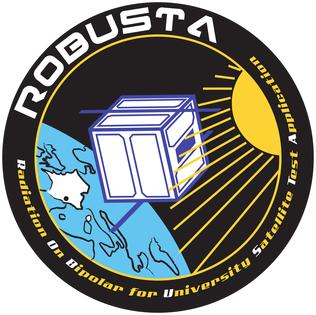Top Qs
Timeline
Chat
Perspective
ROBUSTA
Failed French nano-satellite experiment From Wikipedia, the free encyclopedia
Remove ads
ROBUSTA (Radiation on Bipolar for University Satellite Test Application) is a nano-satellite scientific experiment developed by the University of Montpellier students as part of a Centre National d'Études Spatiales (CNES) call for student projects in the field of orbital systems.[3]
The satellite is a Cubesat, the name given to a series of nano-satellites developed as part of student projects. The ROBUSTA mission is to check the deterioration of electronic components, based on bipolar transistors, when exposed to in-flight space radiation. The results of the experiment will be used to validate a new radiation test method proposed by the laboratory.[4]
Remove ads
Implementation of the project
The duration of the ROBUSTA project is 6 years, beginning in 2006. The satellite was launched on February 13, 2012 on the Vega rocket's maiden flight,[5] and reentered in the atmosphere in February 2015. An anomaly within the battery recharge system resulted in the loss of the satellite after a few days.[6]
Staff
Teams from several sites, coordinated by the Centre Spatial Universitaire Montpellier-Nîmes worked together.[7] These teams are spread over several sites:
- The mechanical design was done by the IUT GMP of Nîmes;
- Energy management was conducted by IUT GEII of Nîmes;
- The ground segment and communication cards are supported by the IUP PGII Montpellier.
- The controller card was done by Polytech Montpellier and IUT GEII Montpellier.
- The payload is managed by the EEA department of the University of Montpellier.
Remove ads
References
Wikiwand - on
Seamless Wikipedia browsing. On steroids.
Remove ads

